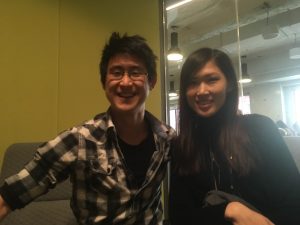Author: Martin Trust Center
MIT’s Storyteller In Residence, Dom Smith chats to MIT students, George Sun and Jodi Zuo about their fascinating wearable tech start-up, Kinematics, and how they plan to help people around the world, alongside some entrepreneurial tips of their own.

Can you introduce yourselves and tell me about what you do here?
Jodi] My name is Jodi, and I’m a second year MBA at Sloan, and I’m working with my partner, George on a startup called Kinematics.
George] My name is George, and I am a fourth year PHD student in Bio Engineering. Our main focus is on bio-electronics and wearable technologies, and as Jodie just mentioned, the technology that we are building is all about trying to understand a person on a more intimate level, besides just having a fitbit or a smartwatch. What we are really interested in is how someone walks. A lot of studies have shown that monitoring how someone walks, and how that changes over time is really demonstrative of their health, and their future health.
What have been the biggest challenges you have faced thus far?
Jodi] The challenge for me right now is to really scoop out the market, as well as identifying the paying customers, and marketing-related challenges including the financial models. We’ve had a lot of help from the Martin Trust Center.
George] Jodi is doing a lot of the real-world navigating and looking at how this will be applied, whereas I am more focusing on the technology side. I think the biggest challenge we have is convincing people that wearable tech is the future, for sports medicine and healthcare. Consumers right now just think of wearables as being their smartwatch, which is just a wristband, basically. We want socks, shoes and clothes.
What are your goals?
Jodi] From a business side we want to find investors, get funding and get our first customer. Hopefully within the next few months we would like to find our first Beta user! Personally, I take this as a great learning experiment.
George] My goal right now is to get myself out of my comfort zone, and to take my technology and give it to someone. I want to hear honest feedback, and how much it doesn’t work. I want to know how my technology is failing. I want to know how to improve. I want to break down all the misconceptions that I have.
How would you advice someone to make the most of this space?
Jodi] The Martin Trust Center, and particularly, the Entrepreneurs in Residence are incredibly useful. There are also lots of talks to go to here that are very interesting. It’s obviously a very good space to be in for meetings, and there’s also a Maker’s Space.
What advice would you give to people getting into entrepreneurship?
Jodi] Do your research, because you don’t know if your idea has been realized in the real world yet. So, it’s important to talk to people.
George] You have to ground yourself and really think, ‘what can I do to penetrate the market’. Be incredibly optimistic and say, ‘I have the skills, and I have the resources’. Even if you don’t have the skills, you can learn them.
How do you feel about making mistakes in the entrepreneurial process?
Jodi] The problem is not making the mistakes, the problem is people being able to admit to making them! We are not afraid of making mistakes, and we are still learning.
George] I think we should look forward to mistakes, and want to build something and then let people critique the hell out of it. Without mistakes there is no room for improvement.
Can you discuss the beginnings of this idea?
George] The beginning was just myself playing around in the garage and putting things together, but then I realized that my products could actually be used by people, and I hadn’t made that personal connection before. Primarily, I work on building devices to measure pressure and movement. I focused in on this niche field because of my sister is a great physical therapist. However, one of her biggest pain points is that she can’t understand how the body moves. As an engineer, I don’t believe it’s right to just look and make a judgment on someone’s health and situation. My goal right now is to give someone like my sister tools to understand how someone walks. That’s actually very simple. It involves putting wearable censors in the shoe, and having them walk for the order of a few seconds, or a minute. I want to give my sister and her community of physical therapists a tool that they can own, to understand whether your health, and walking [gate] can can be improved.


Follow